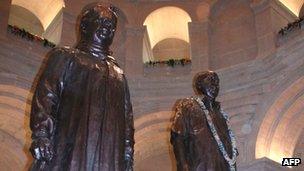Mayawati statues: Race to cover India chief's monuments
- Published
Officials in India's Uttar Pradesh state are struggling to cover statues of Chief Minister Mayawati and her party symbol - an elephant - before a Wednesday deadline.
Election chiefs have ordered the huge statues covered until the end of state assembly polls in March.
Truckloads of cloth and plastic sheets are being used to cover the monuments.
Ms Mayawati is famous for building statues of herself and other icons of her low-caste Dalit community.
In two parks in the state capital, Lucknow, and Noida, a suburb of Delhi, there are nearly a dozen statues of Ms Mayawati and more than 75 stone elephants.
The government has been ordered to cover the statues by Wednesday evening, to avoid any risk of them influencing voters.
Under election rules, portraits and calendars bearing photographs of the chief minister must be removed from government offices ahead of elections.
'Elephantine problem'
On Monday, workers laboured to cover the statues some of which are almost 15 feet (4.6 metres) tall.
"It is an elephantine problem to drape these statues," Ramesh Shukla, a government officer overseeing the operations in Lucknow, told the Associated Press news agency.

Mayawati is famous for building statues of herself and other Dalit icons
On Sunday, officials in Noida ran out of plastic sheets to cover the statues, and had to order 1,500 metres to avoid falling short.
The Election Commission issued the order on Sunday and officials said "it will be fully executed" by the deadline.
Chief Election Commissioner SY Quraishi has said the covering up should be completed "at the earliest".
Ms Mayawati's Bahujan Samaj Party has termed the order as "one-sided and against natural justice".
Several other opposition parties also criticised it, saying the order was "impractical".
On Monday, Mr Quraishi said the criticism was "ill-informed".
"I am surprised this order has been taken as something unusual. There is a model code of conduct which says there should be a level-playing field for all candidates and parties," he told the NDTV channel.
"The code says nobody will get an unfair advantage. Government and public property will not be used for political gain. If portraits have to be removed, it is because it is on public property. Statues are big and they give advantage to the concerned person. The criticism is ill-informed."
'Shameful'
Huge numbers of statues commissioned by Ms Mayawati can be seen in Lucknow and other towns and cities of Uttar Pradesh.
Critics accuse her of self-glorification and wasting public money. She accuses them of conspiring against her.
In September, leaked US diplomatic cables said Ms Mayawati had sent an empty private jet to fetch a pair of sandals from Mumbai - a charge she strongly denied.
Ms Mayawati rules over Uttar Pradesh, one of India's most deprived states with a high crime rate and poor health indicators.
Her spending on statues and memorials has been described as "shameful" by critics.
Statues of political leaders are generally put up posthumously, but Ms Mayawati says that belief is outdated.
- Published3 December 2010